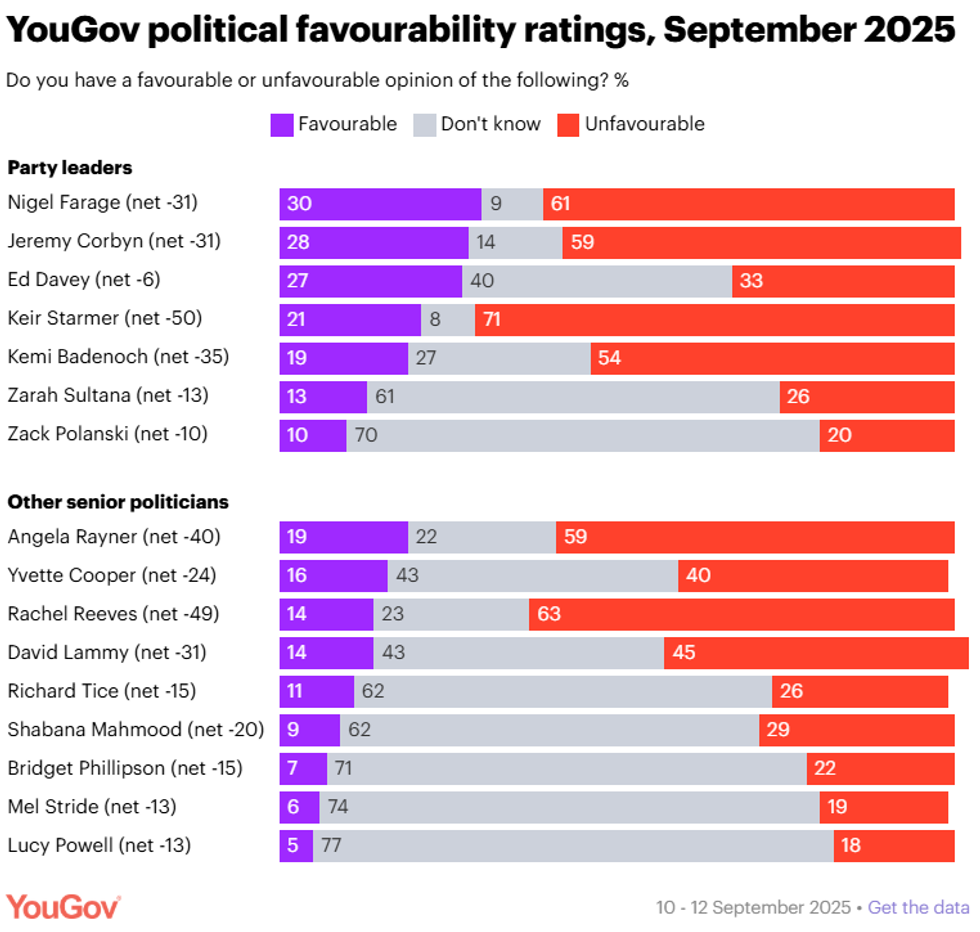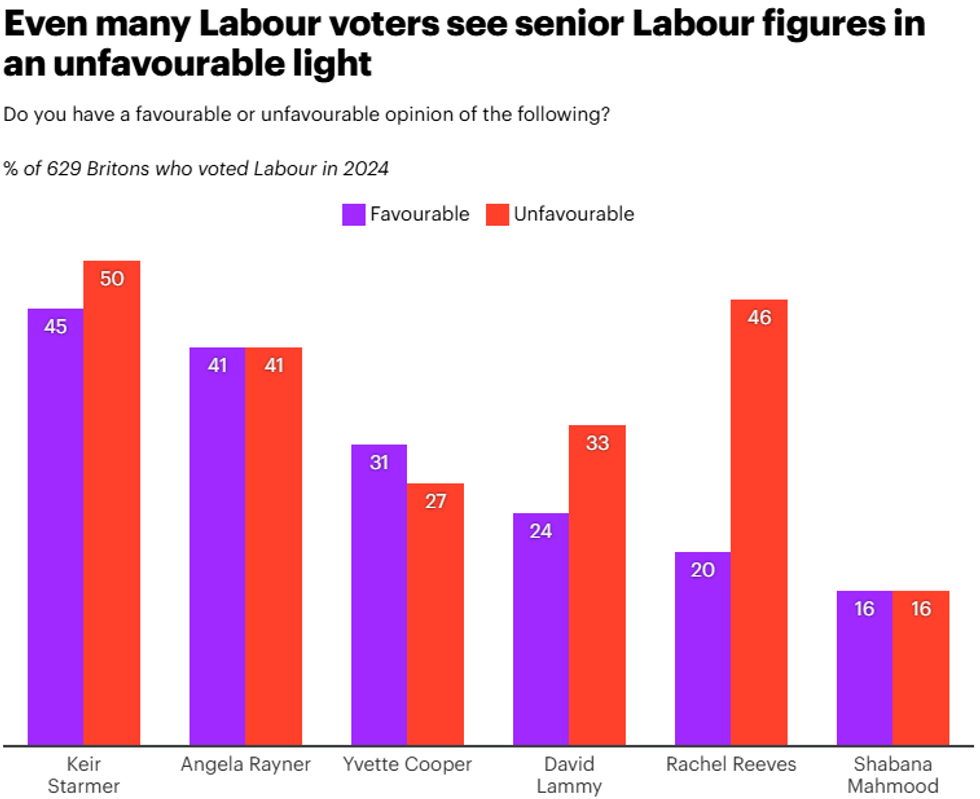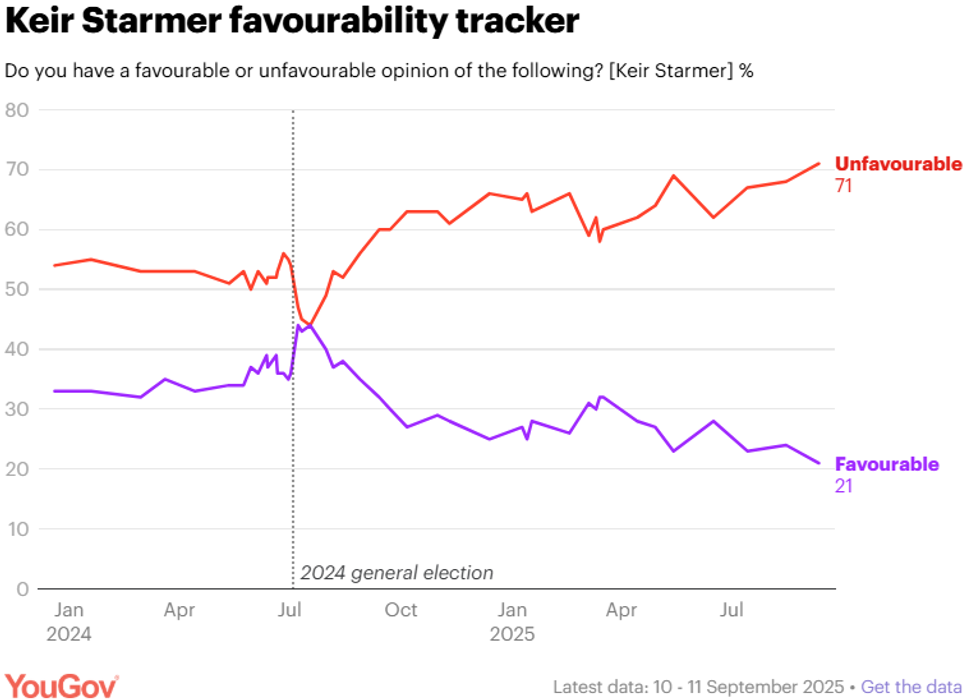A damning new poll has revealed Sir Keir Starmer’s popularity has reached its lowest point as he ranked as the least popular of all the major party leaders.
In the new YouGov poll from September 10 to September 12, just 21 per cent of those asked had a “favourable” view of the Prime Minister, with a whopping 71 per cent having a negative view of the Labour leader, a net score of -50 per cent.
Meanwhile, Nigel Farage’s favourability ratings have remained largely static this month, with three in 10 Britons holding a positive opinion of the Reform UK leader, while roughly twice as many (61 per cent) see him unfavourably, leaving Mr Farage with a net rating of -31 per cent.
Since his return to frontline politics earlier this year, opinion towards Jeremy Corbyn has grown a little more favourable.
Just under three in 10 Britons (28 per cent) now have a positive opinion of the Your Party co-leader, up four points since June, before the launch of his new party, to be co-led with Zarah Sultana.
However, six in 10 Britons (59 per cent) have an unfavourable opinion of Mr Corbyn, down three points since June, giving the Islington North MP a net favourability rating of -31, identical to Mr Farage’s score.
Conservative leader Kemi Badenoch’s ratings have also seen limited month-on-month change.
One in five Britons (19 per cent) have a favourable view of the opposition leader, while a clear majority (54 per cent) see her unfavourably, leaving her with a net favourability score of -35 per cent.
LATEST DEVELOPMENTS:
- Jeremy Corbyn tells GB News there’s ‘no reason’ for Donald Trump state visit as he joins protests
- Judge who wished 7/7 mastermind ‘all the best’ could be openly criticised by Parliament
- Reform UK’s first Labour defection says ‘more will follow’ as he takes brutal parting shot at party

This dramatic decline represents the steepest fall recorded by any British Government since polling records began in 1983.
The previous record belonged to John Major’s Conservative administration, which saw a 9.8-point decrease during its first year following the 1992 election.
No other governing party in modern British political history has witnessed such a rapid erosion of public support during its initial period in office.
Nigel Farage’s Reform UK has capitalised on Labour’s decline, securing approximately 30 per cent support in recent polling and claiming the position as Britain’s most popular party.

The exodus from Labour has benefited parties across the political spectrum, with YouGov data from August revealing that 14 per cent of 2024 Labour voters have switched their allegiance to either Reform UK or the Conservatives.
However, progressive parties have attracted an even larger share of former Labour supporters.
The Liberal Democrats have gained 13 per cent of Starmer’s 2024 voters, whilst the Greens secured 10 per cent and nationalist parties in Scotland and Wales drew 3 per cent.
The Prime Minister’s personal approval ratings mark an extraordinary contrast with other world leaders.

Donald Trump, who is currently on his state visit to the UK, maintains a comparatively stronger position with minus 12 per cent net favourability according to YouGov’s US opinion tracker.
American presidents typically enjoy higher approval ratings than their British counterparts.
Historical parallels offer some perspective on Mr Starmer’s predicament, with his approval trajectory closely mirroring Emmanuel Macron’s first-year performance as French president.
President Macron experienced similarly sharp declines following his 2017 victory, driven by economic unrest and the yellow vest demonstrations, before eventually recovering support by 2022.
Our Standards:
The GB News Editorial Charter







Follow